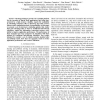721 search results - page 34 / 145 » Exploiting Meta-Level information in a Distributed Schedulin... |
136
Voted
ATAL
2008
Springer
15 years 4 months ago
2008
Springer
Future agent applications will increasingly represent human users autonomously or semi-autonomously in strategic interactions with similar entities. Hence, there is a growing need...
165
Voted
IPTPS
2004
Springer
15 years 8 months ago
2004
Springer
— Peer-to-peer computing, the harnessing of idle compute cycles throughout the Internet, offers exciting new research challenges in the converging domains of networking and distr...
115
Voted
ECSCW
2001
15 years 4 months ago
2001
Distributed cognition as an approach to collaborative work holds that a work unit is cognitive system in which cognitive activities are carried out jointly by workers with the use ...
162
Voted
E4MAS
2006
Springer
15 years 6 months ago
2006
Springer
One large and quite interesting family of MAS applications is characterized (1) by their large scale in terms of number of agents and physical distribution, (2) by their very dynam...
132
Voted
GRID
2006
Springer
15 years 2 months ago
2006
Springer
Desktop Grids have proved to be a suitable platform for the execution of Bag-of-Tasks applications but, being characterized by a high resource volatility, require the availability ...

